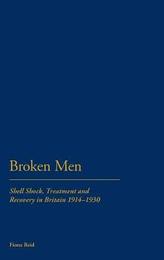
|
Broken Men: Shell Shock, Treatment and Recovery in Britain 1914-30
Hardback
Main Details
| Title |
Broken Men: Shell Shock, Treatment and Recovery in Britain 1914-30
|
| Authors and Contributors |
By (author) Dr Fiona Reid
|
| Physical Properties |
| Format:Hardback | | Pages:224 | | Dimensions(mm): Height 234,Width 156 |
|
| Category/Genre | First world war |
|---|
| ISBN/Barcode |
9781847252418
|
| Classifications | Dewey:616.852120094109042 |
|---|
| Audience | | Postgraduate, Research & Scholarly | |
|---|
| Illustrations |
6 illus
|
|
Publishing Details |
| Publisher |
Bloomsbury Publishing PLC
|
| Imprint |
Hambledon Continuum
|
| Publication Date |
23 February 2010 |
| Publication Country |
United Kingdom
|
Description
Shell shock achieved a very high political profile in the years 1919-1922. Publications ranging from John Bull to the Morning Post insisted that shell-shocked men should be treated with respect, and the Minister for Health announced that the government was committed to protecting shell-shocked men from the stigma of lunacy. Yet at the same time, many mentally-wounded veterans were struggling with a pension system which was failing to give them security. It is this conflict between the political rhetoric and the lived experience of many wounded veterans that explains why the government was unable to dispel the negative wartime assessment of official shell-shock treatment. There was also a real conflict between the government's wish to forget shell shock whilst memorialising the war and remembering the war dead. As a result of these contradictions, shell shock was not forgotten, on the contrary, the shell-shocked soldier quickly grew to symbolise the confusions and inconsistencies of the Great War.
Author Biography
Fiona Reid is Deputy Head of Humanities at the University of Glamorgan, UK. She is the co-editor of Women on the Move: Refugees, Migration and Exile (2010) and is currently working on responses to facial injury during the First World War.
ReviewsThis is a deeply stimulating and, in many respects, arresting book. Based on original research, it breaks new ground in getting us to see how entangled are our ideas and beliefs about shell shock with the meanings we have ascribed to the First World War. If we are to reconsider shell shock, we shall also have to reconsider the First World War. This book will be an invaluable aid in that process. -- Peter Barham, author of Forgotten Lunatics of the Great War. Author article in BBC History Magazine, Novmber 2009 This book offers an important, and as yet under-researched, approach to understanding the history of shell-shock...overall the book is well written, brings to light important material that has been neglected in much of the writing on this topic, and argues convincingly for the importance of returning to primary sources to understand the conflicting versions of shell-shock and their social and political impact, during and in the immediate aftermath of the war. Very importantly, it brings new material and a new angle to this discussion. -- Carol Acton, University of Waterloo, Ontario, Canada. It is Reid's judicious and non-sentimental analysis of the aftermath of war for shell-shocked men that makes this a book well worth reading. -- History Today
|